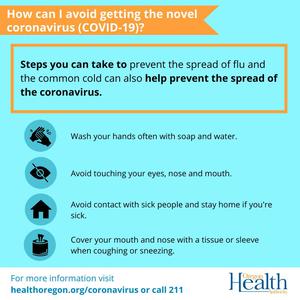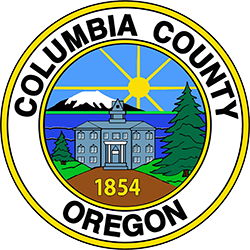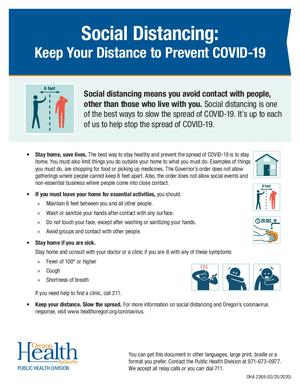Preventing the Spread of Germs
Steps you can take to prevent the spread of flu and the common cold can also help prevent the spread of coronavirus (COVID19)
|
 |
Social distancing
Social Distancing: Keep Your Distance to Prevent COVID-19Social distancing means you avoid contact with people, other than those who live with you. Social distancing is one of the best ways to slow the spread of COVID-19. It’s up to each of us to help stop the spread of COVID-19. • Stay home, save lives. The best way to stay healthy and prevent the spread of COVID-19 is to stay home. You must also limit things you do outside your home to what you must do. Examples of things you must do, are shopping for food or picking up medicines. The Governor’s order does not allow gatherings where people cannot keep 6 feet apart. Also, the order does not allow social events and non-essential business where people come into close contact. • If you must leave your home for essential activities, you should: » Maintain 6 feet between you and all other people. » Wash or sanitize your hands after contact with any surface. » Do not touch your face, except after washing or sanitizing your hands. » Avoid groups and contact with other people. • Stay home if you are sick. Stay home and consult with your doctor or a clinic if you are ill with any of these symptoms: » Fever of 100° or higher » Cough » Shortness of breath If you need help to find a clinic, call 211. • Keep your distance. Slow the spread. For more information on social distancing and Oregon’s coronavirus response, visit www.healthoregon.org/coronavirus. |
|
Handwashing
Keeping hands clean is one of the most important steps we can take to avoid getting sick and spreading germs to others. It is best to wash your hands with soap and clean running water for 20 seconds. If soap and clean water are not available, use an alcohol-based product to clean your hands. Alcohol-based hand rubs are fast acting and significantly reduce the number of germs on skin.
When washing hands with soap and water:
- Wet your hands with clean running water and apply soap. Use warm water if it is available.
- Rub hands together to make a lather and scrub all surfaces.
- Continue rubbing hands for 20 seconds. Need a timer? Imagine singing “Happy Birthday” twice.
- Rinse hands well under running water.
- Dry your hands using a paper towel or air dryer.
- Use your paper towel to turn off the faucet.
When you should wash your hands:
- Before preparing or eating food.
- After going to the bathroom.
- After changing diapers or cleaning up a child who has gone to the bathroom.
- Before and after tending to someone who is sick.
- After blowing your nose, coughing, or sneezing.
- After handling an animal or animal waste.
- After handling garbage.
- Before and after treating a cut or wound.
When using an alcohol-based hand sanitizer:
- Apply product to the palm of one hand.
- Rub hands together.
- Rub the product over all surfaces of hands and fingers until hands are dry.
Resources
Cover your cough
Many respiratory illnesses—including serious ones such as influenza and pertussis (whooping cough)—are spread by coughing or sneezing. Some respiratory illnesses can also spread by direct contact—for example, after someone’s hands become contaminated by droplets from coughing or sneezing.
These illnesses spread most easily in crowded places or households where people are in close contact. Cover your mouth and nose with a tissue when you cough or sneeze. Put your used tissue in the waste basket. Cough or sneeze into your upper sleeve, not into your hands.
Clean all “high-touch” surfaces daily
Clean high touch surfaces and any surfaces that may have blood, stool, or body fluids on them. Use a household cleaning spray or wipe, according to the label instructions. Labels contain instructions for safe and effective use of the cleaning product including precautions you should take when applying the product, such as wearing gloves and making sure you have good ventilation during use of the product.
What to Clean
- High-touch areas such as door handles, phones, keyboards, remote controls, light switches, bedside tables and bathroom fixtures.
- Horizontal surfaces such as counter tops, kitchen tables, desktops and other places where cough droplets could land frequently.
Resources
CDC Cleaning and Disinfection Recommendations
Staying Well
It is also important to keep your body resilient:
- Eat a healthy diet.
- Exercise.
- Get plenty of rest.
- Stay up-to-date on routine vaccines. This includes the flu vaccine. It is not too late to get a flu shot to protect yourself from the flu, which continues to cause illness in Oregon.
- Quit smoking and vaping. Initial research shows that people who smoke may be more likely to develop serious complications from COVID-19. If you'd like to quit, free help is available at 1-800-QUIT-NOW or www.quitnow.net/oregon.
- Stay Home and travel only for essential activities that cannot be conducted remotely.


